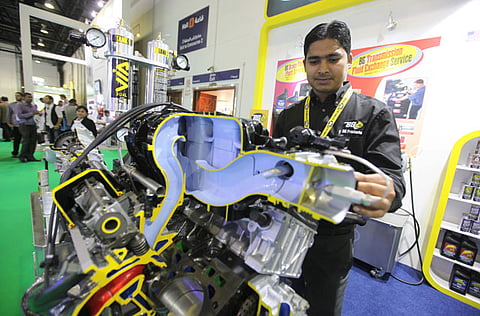Dubai property recovery spurs demand for auto parts
New projects and mall expansions attract more people, driving up auto spend

Dubai: The recovery of the Dubai property market has led to a boost in the consumption of auto parts, according to exhibitors at Automechanika at the Dubai International Convention and Exhibition Centre. The event opened on Tuesday.
As developers launch new projects and expand existing malls, manufacturers and suppliers of auto parts are beginning to see the pre-2008 demand coming back.
“As more projects launch, more people will come to live in Dubai. So, all these people need cars,” said Ahmad Pauwels, CEO at Epoc Messe Frankfurt, the organiser of the exhibition.
Dubai’s auto spare parts foreign trade was valued at Dh37 billion in 2012, up by Dh8 billion, compared to Dh29 billion in 2009, according to Dubai Customs.
Additionally, research by Frost and Sullivan indicated that the consumption of auto components across all types of vehicles in the GCC amounted to around $8.85 billion (Dh32.5 billion) in 2012. It is expected to reach $14.4 billion by 2016.
The UAE and Saudi Arabia are the largest auto component markets in the GCC, accounting for 78 per cent of the total market share.
Industrial segment
The majority of demand for auto parts comes from the industrial segment. With all the new developments and expansions under way, there is an emphasis on logistics as truck parts are more in demand, said Pauwels.
“The region serves as a key import and trans-shipment hub for the aftermarket trade that reaches across the wider hinterland in the Mena region, Iran and Central Asia, South Asia and Eastern Africa,” he said.
In comparison, demand for auto parts in the commercial segment is slow, he said.
“The average age of a car here is much younger than in other countries. People sell their cars after two to three years because they don’t want to drive it anymore. The older your car gets, the more auto parts you need because you have to maintain it. But consumers here don’t see that yet,” he said.
He added that the main focus of manufacturers and suppliers of auto parts related to the commercial segment is on regional markets outside the UAE.
Aftermarket trade
The aftermarket trade in the GCC is dominated by passenger vehicles, which made up around 85 per cent of the auto component market, worth $7.55 billion in 2012, the research by Frost and Sullivan showed.
It also showed that auto parts and accessories dominate the aftermarket consumption in the GCC, valued at $4.51 billion.
Meanwhile, exhibitors have expressed their positive outlook on the automotive sector in Dubai.
Rajat Bajaj, partner at India-based Bajato, which manufactures lights for both passenger cars and trucks, said sales in the Middle East have gone up by 35 per cent over last year. “Demand is driven by technology and quality,” he said.
He said that business is performing better than before the financial woes of 2008. “Before the financial crisis in 2008, we used to export to nine countries, and now we export to 27,” he said.
He added that today, there are “stronger players in the market that sell good quality products, unlike pre-2008 when there were more smaller players that did not make quality products. They have all vanished now.”
But not all exhibitors share his sentiment.
Hotwave Hu from China-based JVK Inc., which manufactures auto lamps and mirrors, said the Dubai market is growing but at a slow pace. “After June last year, import of our products to Dubai slowed down. Our importers had enough stock. I think it’s because the market demand dropped,” he said.
He added that demand from the regional markets is very slow due to the economic situation there. The Middle East makes up 50 per cent of his business’ turnover, he said.
Sign up for the Daily Briefing
Get the latest news and updates straight to your inbox



